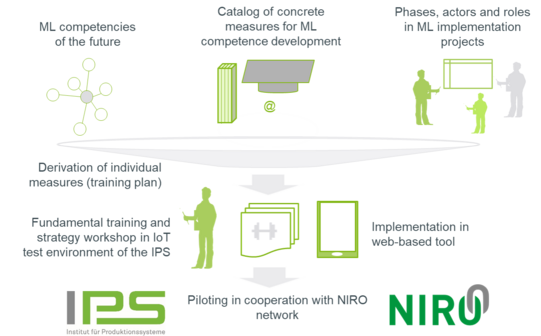ML2KMU
Concept for the development of machine learning competencies for plant manufacturers and manufacturing SMEs
(Project duration October 2019 to October 2022)
Problem
Due to advancing digitization and automation, companies are exposed to a constant transformation process. As a result, old job profiles are becoming obsolete and, at the same time, completely new professions with changing and digital competence requirements are emerging. To prevent technological change from being accompanied by a talent shortage, mass unemployment and growing inequality, companies must take an active role in supporting their existing workforce through further training and upskilling. Employees need to equip themselves with future-proof skills through continuous retraining and further education. These include, in particular, competencies in the area of machine learning (ML), which opens up previously unforeseen potential for knowledge discovery and can thus form a decisive success factor for companies. However, the development of digital skills represents a significant challenge for companies, especially for small and medium-sized enterprises. Often, there is a lack of time and financial freedom for further training or the necessary know-how. In addition, the training market is extremely intransparent, which makes it much more difficult to identify suitable training courses.
Goals
To address the problem of building digital competencies in companies, the ML2KMU project presents a concept to support companies in deriving suitable measures for the targeted development of ML competencies. This provides companies with an overview of required competencies and roles that can be matched with the existing competencies in the company. Furthermore, a training catalog is built up on the basis of current further training opportunities, which allows the identified competence gaps to be addressed with suitable further training.

Approach
The research project is designed to run for 24 months. At the beginning of the research work, the framework conditions are analyzed. This includes a requirements analysis of the ML competence needs of the future. A catalog of generally accepted ML competencies and a clear understanding of terms will be derived. Afterwards, existing solution patterns of ML competence development are analyzed and compared with regard to their suitability for application in SMEs. Based on this, the measures are linked to the previously identified required ML competencies.
In the next step, a project model for the implementation of ML projects in manufacturing SMEs is developed. For this purpose, existing process models for the implementation of ML projects are analyzed and adapted to the requirements of manufacturing SMEs. Furthermore, a role model with the relevant actors for the implementation of ML projects will be developed. Subsequently, a specific level of the ML competencies determined at the beginning will be derived for the individual distinctive roles.
Next, a concept in the form of methodological support for the targeted derivation of concrete measures for the development of ML competencies for SMEs is created. The basis for this is provided by the previously cataloged measures and the described role models of the actors as potential target profiles. This concept is then transferred into a web-based tool and prepared in a way that is suitable for SMEs. This opens up the possibility of keeping competence development measures up-to-date as well as simplifying access for SMEs in the form of a navigation aid. In addition, a basic ML training course is being designed in the form of a strategy workshop. For this purpose, an IoT test environment at the IPS will be built upon. The data flows from sensor technology via pre-processing to the analysis software are to be made transparent and tangible. These practical insights are to serve the participants and companies as inspiration for future business models and a deeper use of ML processes.
Finally, the project model as well as the concept for deriving measures for the development of ML competencies will be piloted and validated. The use of the IoT test environment is intended to demonstrate the relevance of corresponding ML competencies and serve as a catalyst for the development of new business models at the participating companies. In order to be able to achieve results that are as close to practice as possible, the validation will be carried out together with the NIRO network.
Research, Development and Application Partners
Funding notice
ML2KMU - "Concept for the development of machine learning competencies for plant manufacturers and manufacturing SMEs" - is funded as part of the doctoral network "Digital sovereignty in business, thematic area mechanical engineering of the future - a project of the Institute for Innovation and Technology (iit)".


![[Translate to English:] [Translate to English:]](/storages/zentraler_bilderpool/_processed_/2/6/csm_Altes_Maschinenbau-Gebaeude_3a1a87015a.jpg)


